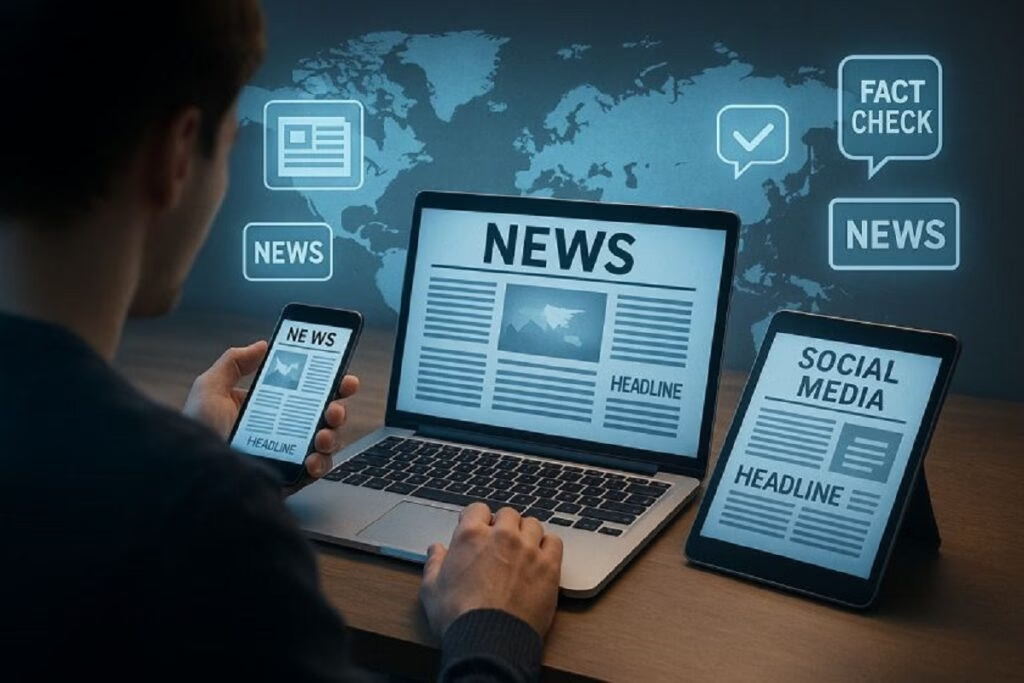Introduction: Why Reliable News Matters
In a world fueled by information, staying informed is more important than ever. News is not just a means of understanding what’s happening around us—it shapes public opinion, influences government policy, and affects our personal and professional decisions. But with the digital age comes a flood of both reliable and unreliable information. So how do we navigate it?
The ability to access accurate, unbiased news is essential for maintaining a well-informed society. With major world events unfolding by the minute—from pandemics and wars to elections and scientific breakthroughs—it is critical to consume news that’s factual, verified, and balanced.
How to Identify Reliable News Sources
With countless news outlets available online, distinguishing between reliable and unreliable sources can be tricky. Here’s how to spot trustworthy news:
1. Check the Source:
-
Is it a well-established organization like BBC, Reuters, Associated Press, or The New York Times?
-
Does the website have an editorial team and transparent ownership?
2. Verify the Author:
-
Is the author named?
-
Do they have a credible history in journalism or subject expertise?
3. Look for Citations & Sources:
-
Good reporting includes quotes from experts, data from studies, and official records.
-
Are the facts traceable to an original source?
4. Watch for Sensationalism:
-
Reliable news avoids exaggerated headlines and emotional manipulation.
-
Be cautious of all-caps, exclamation marks, or overly dramatic tones.
5. Cross-Check the Story:
-
Check multiple reputable sources to see if the same story is reported consistently.
Impact of Fake News & Misinformation
Fake news is not just misleading—it’s dangerous. It can manipulate public opinion, interfere with elections, incite violence, and even harm public health, as we saw during the COVID-19 pandemic.
Consequences of Fake News:
-
Public Panic: False information can spread quickly and lead to widespread anxiety.
-
Polarization: Misinformation often feeds political division and distrust.
-
Harmful Decisions: People may make life-impacting decisions based on false data (e.g., health, finance).
-
Loss of Trust in Media: Repeated exposure to fake news can lead to cynicism and skepticism toward all journalism.
Combating fake news requires media literacy, fact-checking, and responsible content sharing.
Major Current Events Overview
Staying informed means understanding the key global events shaping our world today. Here are a few major themes currently dominating headlines (as of mid-2025):
-
Climate Change & Extreme Weather: Record-breaking heatwaves, floods, and environmental protests worldwide.
-
Global Politics: Tensions between major powers (U.S., China, Russia), refugee crises, and upcoming elections.
-
Technology & AI: Concerns over AI regulation, data privacy, and how automation is impacting jobs.
-
Health & Science: Advances in cancer research, mental health awareness, and post-pandemic recovery efforts.
-
Economic Shifts: Inflation, crypto market movements, and changing employment trends in the global gig economy.
Keeping up with these developments helps citizens understand their rights, vote intelligently, and make informed choices.
Role of Social Media in News Dissemination
Social media platforms like Facebook, X (formerly Twitter), YouTube, TikTok, and Instagram have transformed how people consume news. While they offer speed and accessibility, they also pose serious risks.
Advantages of Social Media in News:
-
Instant Updates: Real-time coverage from around the world.
-
Citizen Journalism: Eyewitnesses can share events as they happen.
-
Engagement: Audiences can comment, question, and participate in conversations.
Risks of Relying on Social Media:
-
Algorithm Bias: Platforms often show content based on what users like, creating echo chambers.
-
Lack of Verification: Anyone can post anything, regardless of accuracy.
-
Misinformation Spread: Viral content is often sensationalized or false.
-
Short Attention Spans: Users consume headlines without reading the full context.
Using social media responsibly means cross-checking before sharing and following verified journalists or news outlets.
Global Political & Social Trends
Modern news coverage helps citizens keep track of broader political and societal shifts:
1. Political Realignment:
-
Democracies are facing internal divisions.
-
Populist movements and protests are rising worldwide.
-
Trust in institutions is declining, increasing demand for transparency and reform.
2. Social Justice Movements:
-
Topics like racial equality, gender rights, and indigenous land protection are central to public discourse.
-
Activists and news coverage are helping push reforms in law and policy.
3. Technology Regulation:
-
Governments are debating how to regulate AI, surveillance, and big tech monopolies.
-
Cybersecurity and privacy are hot-button issues globally.
4. Geopolitical Shifts:
-
Power dynamics are changing as developing nations grow economically and politically influential.
Understanding these trends enables citizens to participate more meaningfully in democracy and social progress.

Importance of Media Literacy
Media literacy is the ability to critically analyze news content and understand how media works. It is an essential skill in the digital age.
Why Media Literacy Matters:
-
Helps distinguish between facts, opinions, and bias.
-
Prevents spreading misinformation unknowingly.
-
Encourages healthy skepticism without falling into cynicism.
-
Supports mental health by reducing exposure to manipulative content.
Tips to Improve Media Literacy:
-
Follow independent fact-checkers like Snopes, PolitiFact, or FactCheck.org.
-
Use tools like Google Reverse Image Search to verify images.
-
Learn to recognize bias and framing techniques in news writing.
-
Encourage critical thinking in schools and communities.
Conclusion & Call for Responsible Consumption
Reliable news is the foundation of an informed society. In a world filled with noise, rumors, and digital manipulation, it is our responsibility as readers, viewers, and sharers to support truth and accuracy.
By learning how to recognize credible sources, understand global events, and critically engage with content, we can protect ourselves—and our communities—from the harmful effects of misinformation. Being informed doesn’t just benefit individuals; it strengthens democracy, drives progress, and fosters mutual understanding.
So, stay curious, stay critical, and above all—stay informed.